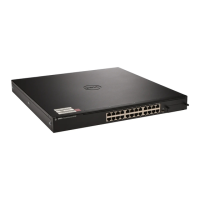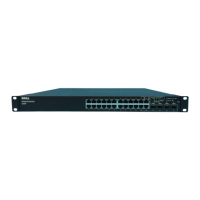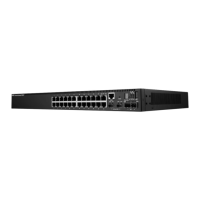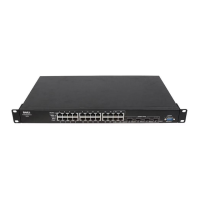238 Configuring System Information
–
Spanning Tree
— Enable or disable activation of spanning tree traps by selecting the
corresponding line on the pull-down entry field. The factory default is enabled.
• QOS Traps
–
ACL Traps
— Enable or disable activation of ACL traps by selecting the corresponding line on the
pull-down entry field. The factory default is enabled.
•Multicast Traps
–
DVMRP Traps
— Enable or disable activation of DVMRP traps by selecting the corresponding
line on the pull-down entry field. The factory default is disabled.
–
PIM Traps
— Enable or disable activation of PIM traps by selecting the corresponding line on the
pull-down entry field. The factory default is disabled.
• Captive Portal Traps
–
Captive Portal Trap Mode
— Displays the captive portal trap mode status. Enable or disable by
selecting the corresponding line on the pull-down entry field. The factory default is disabled.
–
Client Authentication Failure Traps
— When enabled, the SNMP agent sends a trap when a
client unsuccessfully attempts to authenticate with a captive portal.
–
Client Connection Traps
— When enabled, the SNMP agent sends a trap when a client
authenticates with and connects to a captive portal.
–
Client Database Full Traps
— When enabled, the SNMP agent sends a trap each time an entry
cannot be added to the client database because it is full.
–
Client Disconnection Traps
— When enabled, the SNMP agent sends a trap when a client
disconnects from a captive portal.
Configure Trap Flags Using CLI Commands
For information about the CLI commands that perform this function, see the
SNMP Commands
chapter
in the
CLI Reference Guide
. The following table summarizes the equivalent CLI commands you use to
configure trap flags.
OSPFv2 Trap Flags
The OSPFv2 Trap Flags page is used to specify which OSPFv2 traps you want to enable or disable.
When the condition identified by an active trap is encountered by the switch, a trap message is sent to
any enabled SNMP Trap Receivers, and a message is written to the trap log.
Table 6-54. Trap Flag Commands
CLI Command Description
snmp-server enable traps Enables SNMP traps globally or enables specific SNMP traps.
show trapflags Shows the status of the configurable SNMP traps.
show trapflags captive-portal Shows the status of captive portal trapflags.
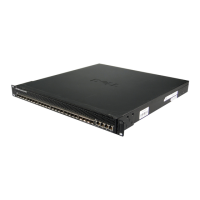
